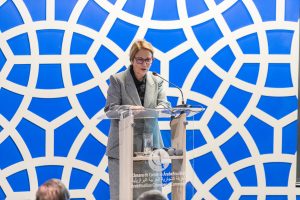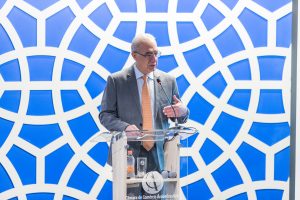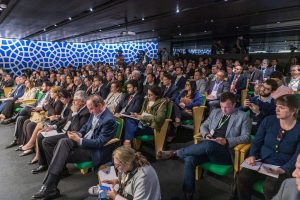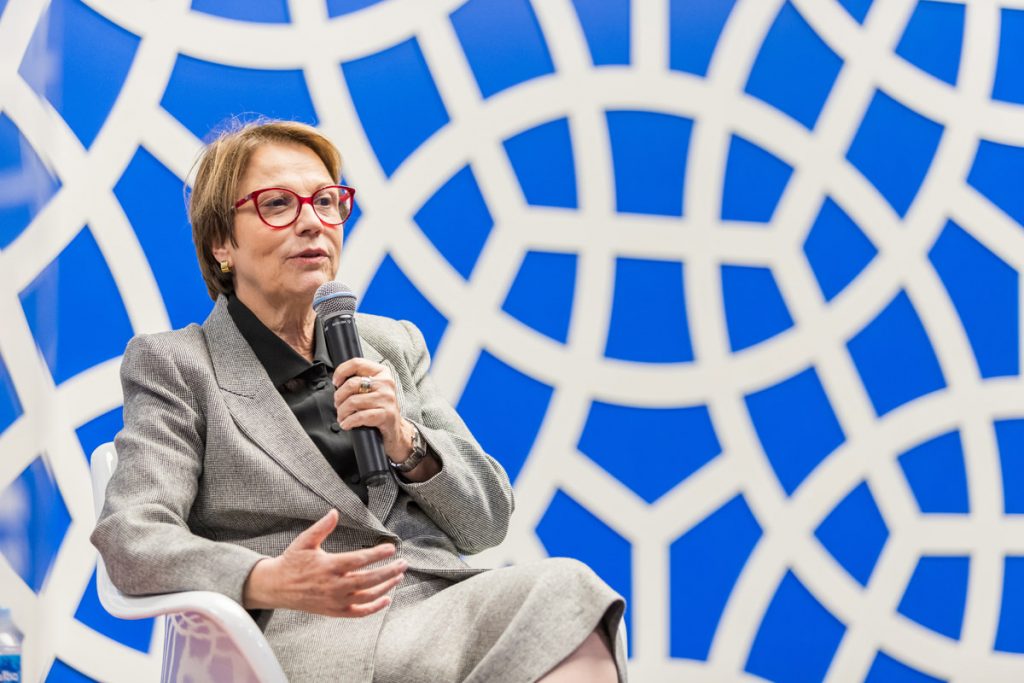São Paulo – Brazil’s minister of Agriculture, Livestock and Supply Tereza Cristina (pictured) said this Monday (26) that she’d like to see Arab investment in Brazilian agribusiness. She spoke during an event at the offices of the Arab Brazilian Chamber of Commerce, in São Paulo, to an audience of executives, mostly from Chamber member companies, and guest authorities.
Cristina said the potential is in place for Brazilian-Arab business to increase through investments. “The Arab League comprises some of the leading investors in the world, and they are stepping up their investment in different parts of the world,” she said, noting that Brazil does not rank among the leading destinations for investments from those countries, even though it’s a top-ten target for worldwide investors.

The minister said opportunities are ripe in various agribusiness production chains, like inputs, machinery, production, processing, storage, distribution, transport, research, technology, and innovation. “The resumption of growth in Brazil hinges on internal and external resources, to be applied into different sectors of the economy, especially in direct or indirect connection with agribusiness, as is the case with infrastructure,” said Tereza Cristina.
According to her, Brazilian agribusiness boasts high productivity, but some aspects, from farm to seaport, detract from its international competitiveness. One of the main chokepoints right now is the need to modernize and expand the infrastructure for shipping off product. “This challenge requires international partnerships in order to be overcome,” she said.
Tereza Cristina also pinpointed fruit juices as a sector to be invested in, noting that Brazil is the third biggest producer of raw materials for fruit juice, and the leading orange juice exporting country. “With a few short examples, we have shown there’s plenty of room for strategic, long-term, win-win strategies. The fraternal relations between the Arab community and Brazil are surely a great foundation for these partnerships,” she argued.
The minister went on to discuss Arab-Brazilian partnerships in commerce, especially of agribusiness products. “We are familiar with the requirements of Arab markets, and its consumers know and approve of our products. We take great pride in being one of the leading halal protein exporters in the entire world,” she said. Brazilian-Arab trade amounts to USD 20 billion a year, 70% of which come from agribusiness.

But the minister would like to see those numbers go up through an increase in sales of products already being traded and the addition of new items. “Brazil is perfectly able to increase its sales of various agricultural products already being sold to the Arab League, but whose relevance within total exports from Brazil to those country is minimal, cases in point being cotton, cocoa, and fresh or dried fruit like guava, mango and lime,” said Cristina.
She also told the audience that she’s taking a trip to Egypt, Saudi Arabia, Kuwait and the UAE from September 11 to 23. “The goal is to find out what their needs and future outlook are, and advance Brazil’s trade and investment relations with them,” she explained. Cristina added that just like Arabs, Brazilians value lasting relationships underpinned by respect, transparency and reciprocity. “Those shared values have brought us thus far, and will surely take us much further,” she said.
The minister spoke briefly about the issue that has drawn international attention to Brazil in the past few days – the Amazon rainforest fires. Cristina said remarks from France’s president Emmanuel Macron were opportunistic. “This does tarnish the image of Brazil, which hadn’t been all that great to begin with,” she said, adding that nevertheless, common sense prevailed in G7 discussions on the matter. “We were backed by seven countries which said that separate things must be considered separately,” the minister stated.
Tereza believes Macron’s stance has to do with the signing of the European Union-Mercosur agreement. “It has surely raised concerns in some countries, due to the strength of our agribusiness, to the markets we can take away. Particularly when it comes to Ireland, we sensed concerns regarding meats during our negotiations, and the same holds true of France. French farmers are rebelling against Brazilian products. They’re trying to denigrate the image of our products due to a problem that’s to do with trade, rather than the actual products,” she said.

In opening the event, Arab Chamber president Rubens Hannun said the minister has been playing a key role in supporting and encouraging Brazil’s trade with Arab countries. Hannun told Tereza Cristina and the audience that the Arab Chamber has been focusing more and more on agribusiness in the past few years. He also said the Chamber and the University of São Paulo ((USP)’s Luiz de Queiroz College of Agriculture (Esalq) are working on an in-depth study on food security in Arab countries and Brazil’s role in that respect.
“We want to take a step further from the occasional sales and purchases of food and agricultural products with Arab countries and to enter into a true strategic partnership,” said Hannun. He also said that the study, which will cover farming, logistics and investment, will lead to comprehensive discussions and an action plan.
These discussions will take place in events including a food security forum taking place later this year in the UAE, and a logistics forum slated for 2020 in Egypt. “These ongoing discussions will enable our Brazilian and Arab members to look to the future, to set goals in tandem with the Arab and Brazilian governments, and to take advantage of current opportunities,” said Rubens Hannun.

The event was attended by Arab Chamber treasury director Nahid Chicani, International Relations VP and ambassador Osmar Chohfi, Foreign Trade VP Ruy Carlos Cury, Administrative VP Mohamed Orra Mourad, board members Daniel Hannun, William Atui and Mohamad Abdouni Neto, and former presidents Orlando Sarhan and Marcelo Sallum.
Also in attendance were businessman and former Brazilian minister of Development, Industry and Foreign Trade Luiz Fernando Furlan; the head of the Brazilian Ministry of Foreign Affairs’ São Paulo office, Débora Vainer Barenboim-Salej; and Egypt’s commercial consul to São Paulo, Mohamed Elkhatib, among other authorities.
Translated by Gabriel Pomerancblum




